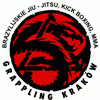Are BJJ practitioners as good as Judo players at throws? Of course not. Are Judo players as good as BJJ stylists on the ground? Of course not. For some reason, the first of these statements is readily accepted, while the second is hotly debated.
If you are one of the few who still believe that Judo "ne-waza" and BJJ groundwork are one and the same, consider the following quotes from two brothers who know what they're talking about...
Dan Camarillo: "After practice I came to the conclusion that Jiu-Jitsu is much more technical and I wanted to know more! I had a problem with new blue belts and here I am, a junior national champion in Judo. So I could not imagine how good their purple, brown, and black belts would be."
"I would have to say at one point the mat work was close, but not anymore. The Gracies have perfected the art, and all the new top BJJ guys out there are coming up with more and more techniques never seen before. The longer BJJ is out there, the more it is pulling away from Judo and it already has pulled far enough away to be on its own. I am not trying to put Judo down in any way at all. I love it, it helps me so much, but I have gotten rid of 90% of the mat work I have learned from it."
Dave Camarillo: "Bottom line for those who know both arts: know that they are very different in purpose and application. Also, you never hear of Jiu-Jitsu guys claiming that they are the best at throws, but they do use them. I hear a lot of trash talk coming from Judo guys that they are this and that on the ground. Even saying that Judo and Jiu-Jitsu are the same. Well, they are not. I feel that after training with guys like Nino that there are no Judo guys that I have ever seen or fought that could come close to them on the ground."
Judo and BJJ have similar techniques on the ground, but the rules of Judo urge competitors to win with spectacular throws rather than submissions. In contrast, a throw (if it occurs at all) is just the beginning of a sport Jiu-Jitsu match. For the duration of the match, the referee will not interfere with the competitors, who will continuously fight for dominant positions and submission holds until the time is up or someone has tapped out.
It's no wonder that Judo groundwork techniques have suffered in comparison with BJJ, when the following rules are considered:
(1) The lifting rule. Suppose you are standing, but your opponent has you in an arm bar and is going for the finish. What should you do? According to BJJ, the first priority is to reduce the pressure on your elbow by stacking him up (putting your body weight on his legs to keep him from arching his back). Judo rules dictate that you should simply lift your opponent off of the ground (which actually increases the pressure on your elbow), because the referee will stop the match and restart you both standing. This rule gets Judo practitioners in big trouble when they participate in a sport in which the referee will not intervene on their behalf.
(2) The "no apparent progress" rule. In Jiu-Jitsu, if someone balls up and gives his back to his opponent, he is in trouble. Don't be surprised if he ends up being choked into submission before too long. In Judo, it's much more likely that the referee will soon say "matte" (which rhymes with latte and means stop) and stand the fighters up. With very little time to work on the ground, Judo players have no incentive to learn how to gradually improve their position until a finishing hold can be applied.
(3) The 25 second pin. In Judo you can win a match by pinning your opponent for 25 seconds. Why jeopardize a sure win and go for a finishing hold, when all you have to do is hold on? This is certainly another rule that discourages Judo stylists from improving their submission skills from a dominant position.
So what about the Hidehiko Yoshida vs. Royce Gracie fight? If BJJ is so superior on the ground, why couldn't Royce submit Yoshida? In a word, "defense." A gold medalist in Judo really should be good enough to defend himself on the ground if that is his only goal. Keep in mind that it's easier to defend against submissions than it is to execute them, and there are no unstoppable attacks. Royce showed superiority on the ground by repeatedly achieving dominant positions such as the mounted position and taking the back. The fact that he couldn't submit Yoshida doesn't mean that they were equals any more than a lack of a knockout would indicate that two boxers are necessarily equals.
The rules of Judo aren't going to change anytime soon, so expect BJJ to become more and more dominant on the ground as the years go by. Of course, don't hold your breath waiting for BJJ practitioners to be throwing Judo players, either!
wwwmmaeurope.com

Bjj vs Judo ponownie...
Rozpoczęty przez , Ponad rok temu
Brak odpowiedzi do tego tematu
Użytkownicy przeglądający ten temat: 0
0 użytkowników, 0 gości, 0 anonimowych
 FaceBook
FaceBook
10 następnych tematów
-
 Wywiad z Roysem Gracie dla Cross Combat Barcelona
Wywiad z Roysem Gracie dla Cross Combat Barcelona- Ponad rok temu
-
 Grapplers Quest 'Beast of The East'
Grapplers Quest 'Beast of The East'- Ponad rok temu
-
 Seminaria - Krakow.
Seminaria - Krakow.- Ponad rok temu
-
 Jest jakis klub w Bielsku Białej???
Jest jakis klub w Bielsku Białej???- Ponad rok temu
-
 Ratunku! ... jestem nowy.
Ratunku! ... jestem nowy.- Ponad rok temu
-
 Liga BJJ - Kraków 3 IV 2004
Liga BJJ - Kraków 3 IV 2004- Ponad rok temu
-
 Seminarium Brazilian Jiu-Jitsu (Poznan)
Seminarium Brazilian Jiu-Jitsu (Poznan)- Ponad rok temu
-
 Zawody SW w Warszawie 24.01
Zawody SW w Warszawie 24.01- Ponad rok temu
-
 przeczytane w interku
przeczytane w interku- Ponad rok temu
-
 chiałbym zacząc trenowac ! Pomóżcie !!!!
chiałbym zacząc trenowac ! Pomóżcie !!!!- Ponad rok temu




